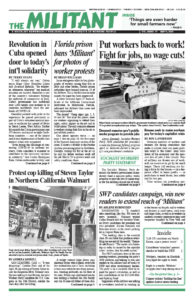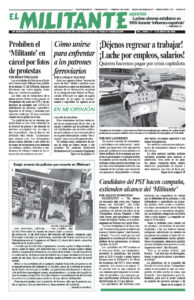ATLANTA — “Things are even harder than usual for small farmers right now, with so much uncertainty about what will happen,” Willie Head told the Militant April 13. Head has several hundred acres of corn, melons, greens and other vegetable crops that are mostly sold in the four counties around his farm in Pavo in south Georgia.
“Most of my crops are sold to a supplier, who resells them to restaurants and fruit stands. But the supplier closed down after the restaurants shut due to government coronavirus orders,” he said. “There just isn’t the same business for takeout food as dine-in, so most were not able to stay open at all. I’m trying to find other buyers, but I’ve had to plow under about one-third of my greens crop.”
Head also has a small number of cattle and pigs. “Small farmers can sometimes sell a couple of head of cattle to get funds for things they need to buy for their farm,” Head said. “But because of the coronavirus scare, the local livestock auctions in Thomasville and Moultrie are closed down.
“That means the farmer has to hold onto his cattle, still pay for feed, and then when things finally open back up, he won’t get top dollar because they’re now over the weight limit set by feed-lot buyers.”
In late March, Head and about 15 other farmers attended a U.S. Department of Agriculture presentation in nearby Quitman for small and minority farmers.
“They offer advice and information on operating loans, taxes and other things,” Head, who is African American, said. “But when the small farmers apply for loans, especially Black farmers, they often don’t qualify. It’s already mid-April and many Black farmers haven’t received their loans yet. They can’t lease land and plant without that money and the loan may be denied, not just delayed. Even if you get the funding, it’s late and the crop doesn’t produce as well.
“I spoke out at the meeting about the example of farmers in Cuba,” said Head, who has visited Cuba several times, meeting with Cuban farmers
A central part of the revolution there, which overthrew the U.S.-backed Fulgencio Batista dictatorship in 1959, is organizing small farmers. They’re ensured access to land to farm and government aid to get seed, fertilizer and other needed materials, and to get their produce to market. Large capitalist farms were expropriated and the land nationalized, guaranteeing that no working farmers would lose their farms.
“Unlike here,” Head told his fellow farmers, “the revolutionary government in Cuba works with farmers to get them the help they need in a timely way.”

